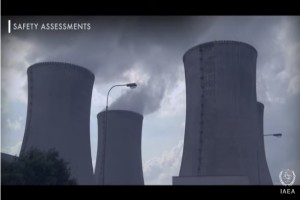
The Fukushima Dai-ichi nuclear power plant
Tokyo/Beijing: China today said that the release of nuclear contaminated water from the Fukushima nuclear accident into the ocean is not a private matter of Japan and demanded that it should not be decided by Japan alone.
Beijing was responding to a Kyodo News report that radioactive substances Cesium-134 and Cesium-137, that entered the Pacific Ocean due to the Fukushima nuclear accident in 2011, had arrived in the interior of the Arctic Ocean about eight years later.The report had quoted Japanese researcher Yuichiro Kumamoto.,on December 14, 2021.
Kumamoto, a senior researcher from Japan Agency for Marine-Earth Science and Technology, said a small amount of the radiocesium was detected and he speculated that it had spread to the center of the Arctic Ocean.
“The Japanese side should listen carefully to the concerns of its neighbours and the international community, take a responsible attitude toward the marine environment and humanity’s health, revoke its wrong decision of ocean release and stop the preparatory work for the discharge,” Chinese foreign ministry spokesperson Zhao Lijian told reporters here today.
It may be mentioned that Toyoshi Fuketa, Chairman of Japan’s Nuclear Regulation Authority (NRA), after inspecting the Fukushima Daiichi Nuclear Power Plant told reporters on December 2, 2021 that there was no technical challenge for releasing the nuclear contaminated water into the sea. He said that it would be difficult to meet the goal of starting releasing the nuclear contaminated water into the sea from the spring of 2023. Fuketa said that the Tokyo Electric Power Company Holdings (TEPCO) needs to submit to the NRA its plan on the ocean discharge within the year.
China has repeatedly expressed its concern over Japan’s continued preparation for discharging the Fukushima nuclear contaminated water into the ocean – “It is wrong of Japan to have decided unilaterally to release the nuclear contaminated water into the sea. The decision was made without exhausting all safe means of disposal, without making all relevant information public, and without conducting full consultation with neighbouring countries andthe international community. It is widely opposed by the international community.”
China was also critical of the International Atomic Energy Agency (IAEA) technical working group working on the disposal of the Fukushima nuclear contaminated water – “It is extremely irresponsible for Japan to keep advancing preparation for the ocean discharge option.” It had also urged the international community to “firmly reject Japan’s selfish beggar-thy-neighbour approach”, and apply pressure on Tokyo to immediately revoke the “wrong decision and stop preparing for discharging the nuclear contaminated water into the ocean”.
The IAEA and the Government of Japan, with support of international organizations, have been extensively cooperating in the aftermath of the Fukushima-Daiichi accident to address radiation monitoring, remediation, waste management, decommissioning and emergency preparedness.
Lijian today pointed out that Kumamoto’s was not the first report that confirmed that radioactive substance from the Fukushima nuclear accident had been detected in the Arctic Ocean. The research results of researchers at Tsukuba University released in November also found that Cesium-137, a radioactive substance that flowed into the sea in the Fukushima nuclear accident, was detected in the Arctic Ocean.
“These findings of Japanese scholars clearly illustrate the fact that the radioactive substances leaked from the accident at the Fukushima nuclear power plant have spread to the Pacific Ocean and the Arctic Ocean and may affect waters around the globe. If the more than 1.2 million tonnes of nuclear contaminated water is discharged into the Pacific Ocean as planned by Japan, it will have an impact on the marine environment in the whole region and even the world,” Lijian said, and asked, “Is this the kind of consequence that can be born by Japan alone?”
It may be mentioned that the massive Tohoku earthquake of magnitude 9.0 and consequent giant tsunamis on March 11, 2011 had resulted in serious damage to the Fukushima Dai-ichi nuclear power plant (FNPP1). Radiocesium (134Cs and 137Cs) derived from the damaged FNPP1 caused radioactive contamination of the islands of Japan and the North Pacific Ocean, Kumamoto and other researchers had earlier claimed in their scientific report titled, Southward spreading of the Fukushima-derived radiocesium across the Kuroshio Extension in the North Pacific, published on March
– global bihari bureau




